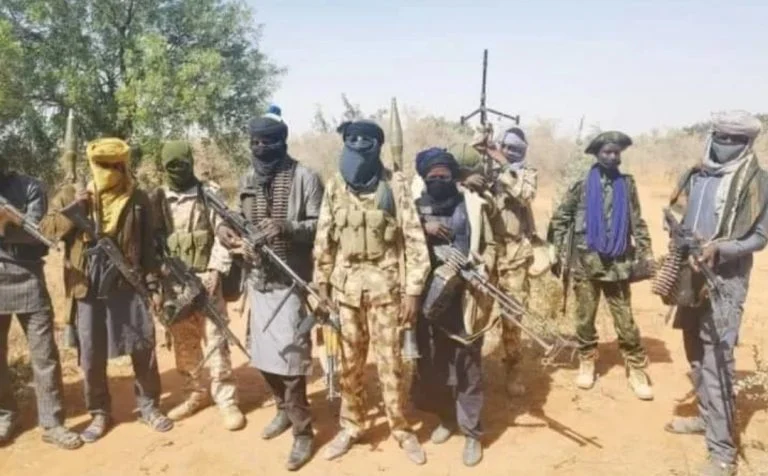
A rural road along the Kano–Katsina border near Funtua, through which bandits reportedly cross into Shanono villages at night.
SHANONO, KANO – At sunset, when the last call to prayer fades across Faruruwa village, silence descends — not the peaceful kind rural life once promised, but a silence shaped by fear, ritual caution, and survival. Doors are bolted. Lights go dim. Conversations whisper. Families retreat indoors, knowing that night now belongs to the bandits.
Shanono Local Government Area, lying 87 kilometres northwest of Kano city and edging the insecure boundary with Katsina State, has become the latest fragile frontline in Nigeria’s expanding rural conflict. Once a quiet agricultural belt, the zone now embodies the creeping insecurity that has pushed deeper into Kano, a state once seen as a regional sanctuary. Hussaini Ibrahim, writes.
“We are living between life and death,” a farmer in Faruruwa said, his voice barely above a murmur. “Every night, we sleep with fear. Every day, we farm with fear. This is no longer life.”
He asked not to be named — a silence echoed by many — for speaking openly carries risks of retribution.
A Vulnerable Border, A Familiar Pattern
The violence here is neither sudden nor isolated. Community leaders, vigilante groups and residents trace the escalation to around 2022.
What began as sporadic cattle theft has evolved into coordinated raids led by heavily armed groups travelling from Katsina through unmanned bush corridors, striking settlements such as Faruruwa, Kuraku, Goron-Dutse, Tsaure and Yan-Shado.
“They come in force,” said Yahaya Umar Bagobiri, chairman of the Faruruwa Security Committee. “They cross from Katsina, enter Kano and disappear again before security can mobilise.”
Villagers describe motorbike convoys — thirty to fifty bikes, each carrying two or three armed riders — sweeping into town just before dusk or deep in the night. The attacks are swift: homes surrounded, livestock herded away, phones confiscated, and anyone resisting beaten or abducted.
Bagobiri estimates that over 1,600 cows have been stolen, alongside motorcycles, harvests and household valuables. The economic loss is deep, and the psychological damage deeper.
“Some villages are empty now,” he said. “People ran to Katsina for safety. Imagine that — fleeing from Kano into Katsina.”
The irony is not lost on anyone.
Lives Interrupted, Communities Unravelled
Displacement is unfolding quietly — family by family — rather than in the mass exodus seen in Nigeria’s central and northwestern warzones. But the impact is no less devastating.
Hassan Isah moved his wife and children to Hotoro in Kano city but still travels back to Shanono intermittently to check on his farmland.
“My heart is always in my throat on that road,” he said. “But farming is our only life. If I abandon it, what will I become?”
Another resident, a 60-year-old farmer, insisted his name not be disclosed:
“Bandits are testing the ground. If the government does nothing now, Shanono will fall the way parts of Katsina fell.”
Schools are thinning out. At local markets, sellers sit beside unsold produce. Night markets — once a social and commercial tradition — have been suspended.
Fear has altered rhythm, economy, and identity.
‘A Community Cannot Survive When Fear Becomes the Currency’
Agricultural decline is becoming one of the most urgent consequences. Farmlands closest to the Katsina border now lie overgrown, their owners unwilling to risk being ambushed in the fields.
“If help does not come, these towns will empty out,” a village elder in Kuraku warned. “A community cannot survive when fear becomes the currency.”
With Kano still dependent on rural grain and livestock flows, the long-term implications touch everyone — not only those living in the borderlands.
Security Response: Visible but Insufficient
The Kano State Police Command confirmed the arrest of two suspected bandits linked to recent attacks in Farin Ruwa. Police spokesperson SP Abdullahi Haruna said intelligence efforts are being intensified and described the arrests as part of broader operations.
“The operation was based on credible intelligence from the community,” he said. “More arrests are expected.”
But residents say the scale of the threat dwarfs the response.
“Two arrests will not stop 150 gunmen,” a vigilante member said. “We need soldiers, not condolences. And we need intelligence, not promises.”
Unlike formal security units, vigilante groups are poorly equipped, often carrying only hunting rifles or Dane guns against bandits armed with assault rifles.
It is a defensive structure engineered to fail.
Analysts Warn Kano Is at a Turning Point
Security analyst Detective Auwal Bala Durumin Iya was blunt in his assessment:
“Kano is no longer immune. What is happening in Shanono is a slow expansion — predictable and preventable. If urgent steps are not taken — military presence, intelligence fusion centres, forest surveillance — the infiltration will become full settlement.”
He added that the porous border with Katsina acts as both a corridor and shield. Bandits retreat across state lines before security forces can mobilise, exploiting administrative boundaries to evade pursuit.
“This is a cross-state problem being treated like a localised one,” he said.
Kano State Assembly Raises Alarm — But Villagers Say Action Is Minimal
The Kano State House of Assembly recently warned of rising cattle rustling and violent attacks in Tsanyawa, Bagwai, and Shanono. Lawmakers called for: Reinforcement of security posts,
Restoration of abandoned border patrol units, and direct support to affected communities.
Yet in Shanono itself, many say they have seen no structural shift.
“We deserve to know what is happening,” said a teacher who fled Kuraku. “Even if they cannot stop the bandits yet, let them talk to us. Silence is deadly.”
Attempts to reach the Commissioner for Internal Security and Home Affairs were unsuccessful at the time of filing this report.
Where the Future Hangs in the Balance
The crisis in Shanono is not yet an inferno — but it is a fire spreading under dry harmattan wind.
What is unfolding mirrors the early stages of the collapse of rural security in Zamfara and Katsina a decade ago: Gradual encroachment, localised kidnappings, steady cattle rustling, and
communities fleeing one by one. Once the pattern matures, reversal becomes nearly impossible.
The question confronting Kano is whether it will act before that point arrives.
For now, the nights remain long, the roads uncertain, and the silence heavy.
“We are still here,” the farmer from Faruruwa whispered. “But for how long?”
No one in Shanono is sure anymore.




